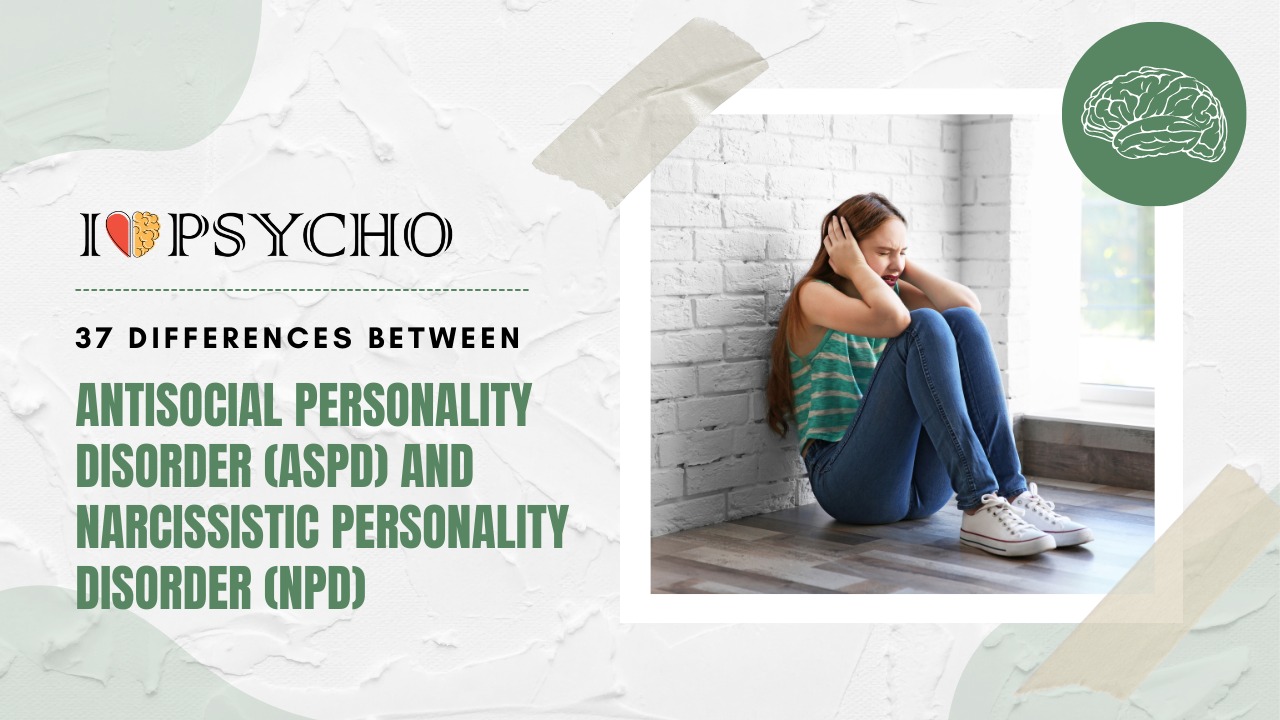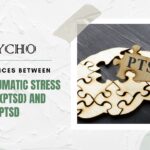ASPD and NPD are different psychological disorders with different behavior, thinking, and emotional control. Although they share certain symptoms, these illnesses are distinct. ASPD is marked by impulsivity, deceitfulness, and a lack of remorse. ASPD patients are manipulative, may have legal issues, and break social conventions without remorse. They may endanger themselves and others. This disease often follows childhood conduct disorder.
In contrast, NPD involves a grandiose feeling of self-importance, a great desire for praise, and a lack of empathy. NPD patients inflate their accomplishments and fantasize about endless success and power. Due to their need for approval, their partnerships are typically exploitative. To preserve their image, NPD sufferers are more calculating than ASPD sufferers, who are typically impulsive.
While both diseases include interpersonal issues, their motives and behaviors differ. ASPD disregards others’ rights, whereas NPD has an inflated self-image and a continual need for admiration. ASPD patients may commit crimes without regard for the repercussions, while NPD patients focus on self-image and attention.
These illnesses have different treatments. Impulsive behaviors empathy and regret are typically addressed in ASPD behavioral therapies. CBT may assist ASPD patients in recognizing and changing detrimental behaviors. However, NPD therapy addresses inadequacies and promotes self-esteem and authentic relationships. However, these illnesses are typically resistant, making therapy difficult.
A lack of empathy and guilt causes impulsive and antisocial behavior in ASPD, whereas NPD causes a grandiose self-image and a desire for adulation. Accurate diagnosis and customized therapy for complex personality disorders require recognizing these variances.
Also Read: 42 Difference between Depression and Seasonal Affective Disorder (SAD)
Here are the 37 differences between antisocial personality disorder (ASPD) and narcissistic personality disorder (NPD):
|
S.No. |
Aspect |
Antisocial Personality Disorder (ASPD) |
Narcissistic Personality Disorder (NPD) |
|
1 |
Core Traits |
Impulsivity, disregard for rules, manipulativeness |
Grandiosity, need for admiration, lack of empathy |
|
2 |
Manipulative Behavior |
Manipulates others for personal gain |
Manipulates others to maintain self-image |
|
3 |
Empathy |
Lack of empathy for others’ feelings |
Lack of empathy for others’ needs and emotions |
|
4 |
Relationships |
Superficial and exploitative relationships |
Exploitative and self-centered relationships |
|
5 |
Antisocial Behavior |
Engages in illegal activities and aggression |
Focuses on self-importance and entitlement |
|
6 |
Criminal Behavior |
Often involved in criminal activities |
Not necessarily involved in criminal behavior |
|
7 |
Guilt and Remorse |
Little to no guilt or remorse for actions |
May feel guilt but not necessarily remorse |
|
8 |
Manipulation Motive |
Manipulates for personal gain or pleasure |
Manipulates to maintain self-esteem and image |
|
9 |
Impulsivity |
Impulsive and reckless behavior |
May exhibit impulsivity but less consistently |
|
10 |
Sense of Superiority |
Focuses on power and control over others |
Focuses on being unique and superior |
|
11 |
Violation of Rights |
Violates the rights of others |
May exploit others but not necessarily violate rights |
|
12 |
Criminal History |
Often has a history of criminal behavior |
May or may not have a criminal history |
|
13 |
Conformity |
Rejects societal norms and rules |
May conform to societal norms when it suits them |
|
14 |
Aggressive Behavior |
Aggressive behavior towards others |
May use aggression when challenged or criticized |
|
15 |
Self-Centeredness |
Highly self-centered and egocentric |
Self-centered and focused on self-importance |
|
16 |
Lack of Accountability |
Rarely takes responsibility for actions |
May shift blame onto others but not always |
|
17 |
Risky Behavior |
Engages in high-risk behavior |
May engage in risky behavior for admiration |
|
18 |
Emotional Manipulation |
Often uses emotional manipulation |
May use manipulation for self-esteem and control |
|
19 |
Self-Image |
May have a negative self-image |
Has a positive self-image and inflated ego |
|
20 |
Impairment |
May have a history of legal, social, and occupational problems |
May have relationship and work difficulties |
|
21 |
Lack of Regret |
Rarely expresses regret for actions |
May regret actions if they harm their image |
|
22 |
Treatment Approach |
Challenging to treat, often resistant to therapy |
May seek treatment for image enhancement |
|
23 |
Grandiosity |
Lacks grandiose beliefs or fantasies |
Has grandiose beliefs and fantasies |
|
24 |
Emotional Fragility |
Less emotionally fragile and resilient |
May have fragile self-esteem and be easily hurt |
|
25 |
Social Exploitation |
Exploits others for personal gain |
Exploits others for admiration and attention |
|
26 |
Recklessness |
Often engages in reckless and dangerous behaviors |
May exhibit recklessness in pursuit of admiration |
|
27 |
Lack of Remorse |
Rarely feels remorse or guilt |
May feel remorse if actions damage self-image |
|
28 |
Treatment Motivation |
Less motivated for therapy and change |
May seek therapy for narcissistic injury |
|
29 |
Provocation |
Easily provoked and may react aggressively |
Provoked by perceived criticism or disrespect |
|
30 |
Legal Implications |
Frequent legal issues and arrests |
May have legal issues but not as consistently |
|
31 |
Short-Term Relationships |
Often has short-lived relationships |
May have unstable but longer-lasting relationships |
|
32 |
Interpersonal Problems |
Frequent conflicts and difficulties in relationships |
Difficulties often related to entitlement and ego |
|
33 |
Hostility |
Hostile and aggressive toward others |
May become hostile when not admired or validated |
|
34 |
Self-Perception |
May see themselves as outcasts or rebels |
See themselves as special and deserving |
|
35 |
Substance Abuse |
Higher risk of substance abuse and addiction |
May use substances to cope with self-esteem issues |
|
36 |
Relationship Motivation |
Motivated by personal gain and control |
Motivated by admiration and validation |
|
37 |
Emotional Regulation |
Poor emotional regulation and anger management |
Emotionally reactive when self-esteem is threatened |
Also Read: 28 Difference Between Schizoaffective Disorder and Dysthymia
Frequently Asked Questions (FAQS)
Q.1 What is ASPD?
Anger, dishonesty, and a lack of remorse are symptoms of Antisocial Personality Disorder (ASPD), a psychiatric illness. ASPD patients may commit crimes without remorse. Childhood conduct disorder is typically linked to this condition.
Q.2 How is NPD different from ASPD?
Narcissistic Personality Disorder (NPD) involves self-importance, adoration, and a lack of empathy. NPD patients overstate their accomplishments and want recognition. whereas both illnesses entail interpersonal issues, ASPD is characterized by antisocial behavior and contempt for others’ rights, whereas NPD is about self-importance.
Q.3 Can these diseases coexist?
Antisocial Personality Disorder (ASPD) and Narcissistic Personality Disorder (NPD) can coexist since they both include manipulative behavior and trouble making friends. A skilled mental health practitioner should make a definite diagnosis after assessing the core condition and any subsequent characteristics.
Q.4 Are ASPD and NPD therapies effective?
ASPD and NPD have different treatments due to their differences. Antisocial Personality Disorder (ASPD) frequently requires cognitive-behavioral therapy to reduce impulsivity, promote empathy, and address criminal behavior. Self-esteem, empathy, and improved relationships are the goals of NPD therapy. Both illnesses are difficult to treat owing to their characteristics.
Q.5 Are people with these diseases aware of their actions?
Individuals with ASPD and NPD may have different levels of self-awareness about their behaviors. ASPD sufferers may not realize how their behaviors affect others owing to a lack of empathy. NPD patients may be more conscious of their behaviors yet rationalize them to maintain their self-image. Individuals’ insights can affect their therapeutic response.









